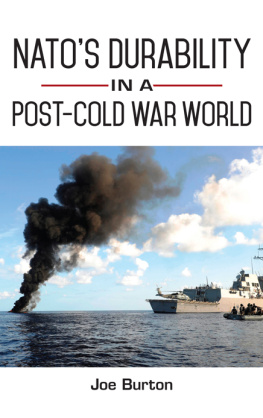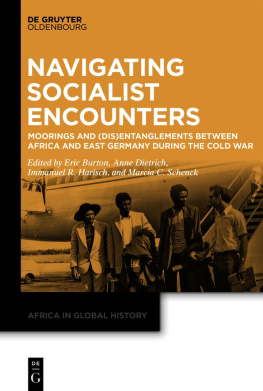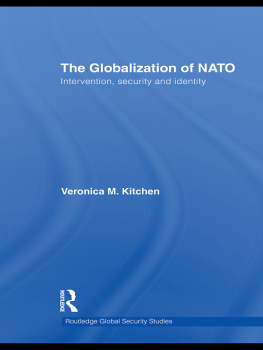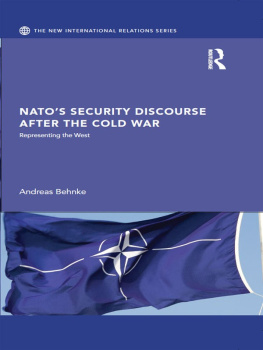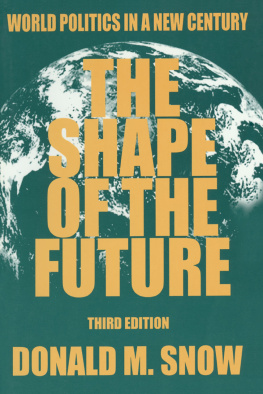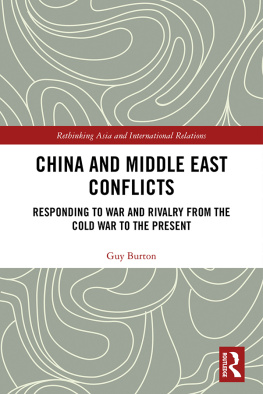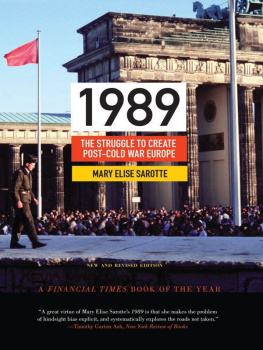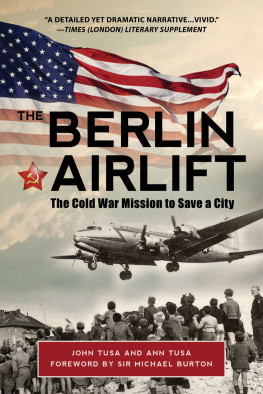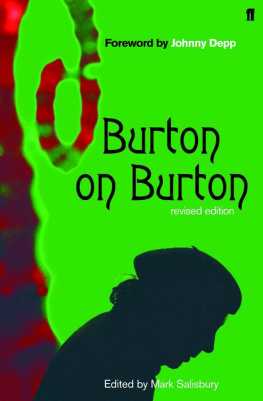Cover photo of NATO mission from Wikipedia.
Published by State University of New York Press, Albany
2018 State University of New York
All rights reserved
Printed in the United States of America
No part of this book may be used or reproduced in any manner whatsoever without written permission. No part of this book may be stored in a retrieval system or transmitted in any form or by any means including electronic, electrostatic, magnetic tape, mechanical, photocopying, recording, or otherwise without the prior permission in writing of the publisher.
For information, contact State University of New York Press, Albany, NY
www.sunypress.edu
Production, Diane Ganeles
Marketing, Anne M. Valentine
Library of Congress Cataloging-in-Publication Data
Names: Burton, Joe, 1977 author.
Title: NATOs durability in a postCold War world / Joe Burton.
Description: Albany, NY : State University of New York Press, 2018. | Series: SUNY series, James N. Rosenau series in global politics | Includes bibliographical references and index.
Identifiers: LCCN 2017017030 (print) | LCCN 2017041859 (ebook) | ISBN 9781438468747 (e-book) | ISBN 9781438468730 (hardcover : alk. paper)
Subjects: LCSH: North Atlantic Treaty OrganizationHistory. | World politics1989-
Classification: LCC UA646.3 (ebook) | LCC UA646.3 .B765 2018 (print) | DDC 355/.031091821dc23
LC record available at https://lccn.loc.gov/2017017030
10 9 8 7 6 5 4 3 2 1
THIS BOOK IS DEDICATED to my parents, Lorraine and Derek Burton, for their constant love and support, and to my wonderful, caring fiance, Simona Soare, whose unerring belief in me has been the most important factor in helping me finish the book.
ACKNOWLEDGMENTS
9/11 WAS THE GENESIS OF THIS BOOK . I was living in London at the time and was shocked to see the brutal and vivid images on my television screen as I returned home from work that evening. I still get emotional when relaying my own experience of that day to my students, most of whom are too young to remember. What I found most surprising though was not that America had been attacked in this horrific way, but the deep acrimony that was generated between European powers and the US in responding to the attacks, particularly over the widening of the war on terror to Saddam Husseins regime in Iraq. It was clear that Al Qaeda was a threat to international security, but the division that emerged in formulating an appropriate response to the attacks was something I felt the need to understand at a deeper level. This naturally led me to the study of NATO as the worlds preeminent alliance, an organization that had bound Europe and America together in common endeavor for more than fifty years at that time, and within which the dispute between the Bush administration and the French and German leaderships played out. I hope this book sheds some light on why the US and European views on security diverge, acrimoniously at times, but also why NATO has survived these challenges and continues to be an organization with an important role in international affairs.
In the process of writing and revising this book, I have acquired a new appreciation of the importance of history to international relations ( IR ) scholarship. When I studied IR at Aberystwyth University in the mid-1990s, students had to complete two papers in international history before we got deeper into IR theory. This historical grounding did me a world of good and I now try to replicate this approach with my own students in New Zealand. History matters. Our knowledge and skills as students and scholars of international relations is only enhanced by the study of history and by an awareness of how history affects theory. I was fortunate to study under some influential scholars, including Ken Booth, Steve Smith, and Michael Cox, but the academic who most comes to mind as I write these acknowledgments is the now emeritus professor at Aberystwyth, Ian Clark, someone noted for his contribution to both IR and history. I remember sitting in one of his seminars and my first contribution to the discussion was to repeat a common misunderstanding about the history of Nazi Germany, which he had just debunked in his lecturea lecture I had just missed. He was kind in his response and did not draw further attention to my obvious absence from his class. The valuable lesson that now informs my approach to this book is to turn up, acknowledge the importance of studying history, and think about how historical impressions can be inaccurate and misleading. I will be sending him a copy of this book with my thanks.
There are many other people I need to thank. First and foremost, my academic and professional mentor, Robert G.Patman, whose patience and support has enabled me to earn my doctorate and transition into academia. Thanks also to Lena Tan and David MacDonald for their valuable input at an early stage of the project. I would like to thank colleagues and friends at the Politics Department, University of Otago, for supporting me in my research and providing me with funds to travel to NATO to conduct interviews in 2010. Being in New Zealand studying a transatlantic security organization was not easy at times, but this opportunity helped me to appreciate the complexities of the alliance first hand. Particular thanks go to Philip Nel, Chris Rudd, and Najibullah Lafraie for providing a supportive environment for my research. Najibullah Lafraie (Otago), Tanya Ogilvy-White ( ANU ), and Benjamin Schreer (Macquarie) also gave me extensive feedback when this project was in its formative phase and this helped strengthen the work considerably.
I would like to thank James Ketterer and Jess Scott at Bard College, New York for their friendship and support. My six weeks in America in July and August 2014 would not have been possible without their hard work and commitment to giving international scholars opportunities to study in the US , and I met many scholars and policy makers during my time on the SUSI fellowship who informed my thinking about the history and future of the transatlantic relationship. I would like to acknowledge the support of NATO officials for my work, too. Jamie Shea, Zsolt Rabai, and Michael Gaul in particular have been supportive of my research and have given generously of their time to talk to me about NATO and its global engagement. I traveled to NATO HQ as part of a delegation of scholars from NATO s Global Partners in 2013, which helped my research immeasurably, and returned to NATO in 2015 to conduct interviews as part of a separate project on global perceptions of NATO . I have found NATO staff to be invariably welcoming and open to engagement with the academic community. I would also like to thank the directors of the NATO Global Perceptions Project, Vlad Vernygora, Natalia Chaban, and Martin Holland, for involving me in the project, and supporting me to conduct eighteen interviews at NATO HQ in June 2015, which informed the last chapter on Libya, Ukraine, and ISIS in particular.
My ability to finish this book was helped by a supportive environment for early career researchers at Victoria University of Wellington, where I took my first academic job. Particular thanks go to Ben Thirkell-White, Marc Lanteigne, Robert Ayson, David Capie, and Ken Perszyk for helping me to find my feet in a new environment. My peers and good friends at Vic also helped me, including Greta and Ben Snyder, Valerie Wallace, Catherine Abou-Nemeh, James Kierstead, Manjeet Pardesi, and Michael Daubs. Its been great to be on the same journey with you all. Thanks also to Neil Quigley at Waikato University for allowing me to take some research leave early on in my new position there.


